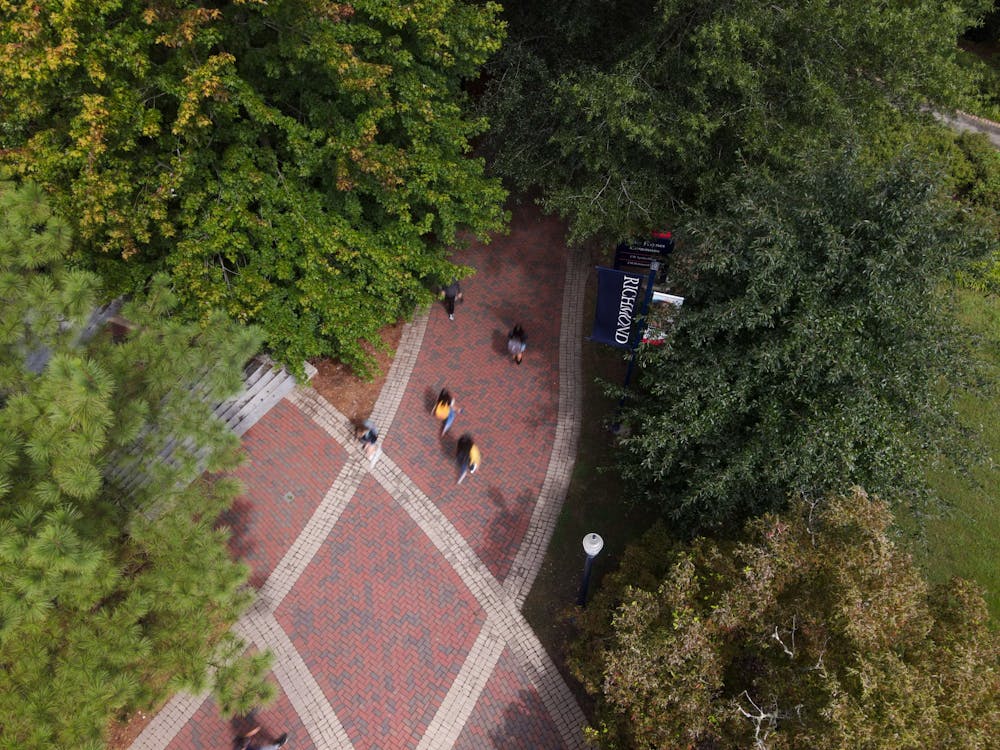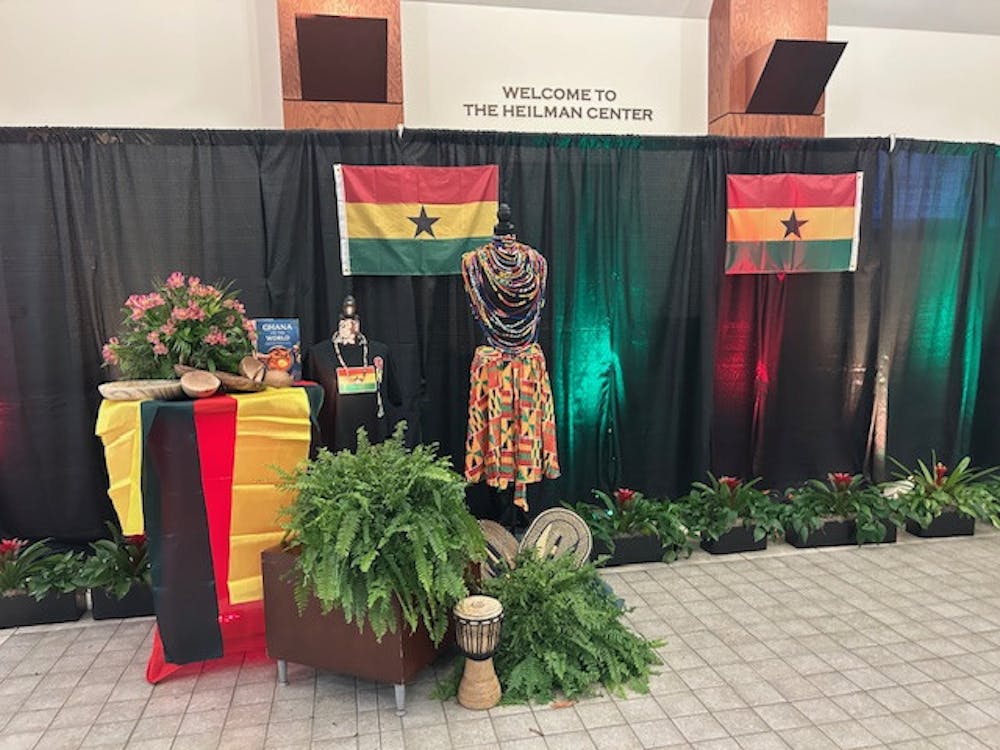Editors note: Confidential sexual assault resources for UR students include CARE Advocates, which can be reached at advocate@richmond.edu or 804.801.6251; Peer Sexual Misconduct Advisors (PSMA), at psma@richmond.edu or 804.346.7674; CAPS, at CAPS@richmond.edu or 804.289.8119; Virginia LGBTQ Partner Abuse and Sexual Assault Helpline (24/7), at 866.356.6998; Greater Richmond Regional Hotline (24/7), at 804.612.6126; National Sexual Assault Hotline (24/7) at 800.656.HOPE.
There have been four timely warnings sent out by the University of Richmond Police Department regarding sexual assault between Feb. 16 and March 7 following a fall semester in which there were no timely warnings of this matter.
"We send timely warnings as soon as the information we need to send it is reported to us," URPD Captain Eric Beatty wrote in an email statement to The Collegian on March 26. "To send the warning, we need to have good information about what crime occurred and that it happened in our Clery Geography."
According to the UR Annual Security Report, which was last updated in 2019, URPD's Clery Geography contains all of UR's buildings and grounds, aside from Campus Drive, Boatwright Drive, College Road and River Road, which are considered public property.
There have been two acts of rape, one sexual assault and one incident of fondling reported in 2021, according to the URPD crime log. In the fall 2020 semester, there was one incident of fondling and one of stalking reported. The four reported instances in 2021 have all received timely warnings, while neither of the two incidents in the fall of 2020 did.
UR's Title IX office provides medical and mental health resources to students who report sexual misconduct to the office, including information as to what the process of making a formal report through URPD involves if a student chooses to report it, according to the office page on UR's website.
Tracy Cassalia, UR's deputy Title IX coordinator for students, wants students to know that despite the COVID-19 pandemic, the Title IX office is responding to reports with the same efficiency as it did prior to the pandemic, she said.
Kaylin Tingle, UR's healthy relationships and violence prevention educator, works in UR's Center for Awareness, Response and Education. Tingle's responsibility is to develop and implement programming, awareness campaigns and training education around violence prevention, which includes UR's programs on consent, healthy relationships and bystander prevention, she said.
Tingle has been in the role since June of 2019, but the position was titled sexual misconduct prevention educator when she was hired, she said.
"I think that the unfortunate thing is, during COVID, it seems like less people are reporting and seeking out resources," Tingle said. "And one might then theorize that, 'well we're practicing physical distancing and people aren't going out and socializing, so [sexual assault] is not happening as much,' and I would caution us to not fall into that trap, because we know it's happening," Tingle said. "I have wondered if folks don't feel as safe to come forward because perhaps they're not familiar with our amnesty policies."
Regardless of if a student is at a bar, at an off campus house party, or engaging in an activity that violates the interim COVID-19 restrictions, UR will not pursue conduct charges related to the violation of the COVID-19 restrictions if a student makes a report of sexual misconduct or files a Title IX concern, Tingle said.
The immunity from COVID regulation violations includes witnesses, the parties involved and anyone reporting the incident or aiding support, according to Kristine Henderson, UR's director of compliance and Title IX coordinator.
Enjoy what you're reading?
Signup for our newsletter
"It is a broad immunity with the idea that we do not want fear of COVID violations to stop anyone from reporting or seeking help," Henderson wrote in a March 31 email statement to The Collegian.
In her role at the Title IX office, Henderson makes sure that UR is in compliance with federal and state regulations and UR policy and procedures, she said.
Henderson said that UR had improved its sexual misconduct resources greatly since she had started working at UR in December 2017. She attributes a lot of that to the work of the President's Advisory Committee for Sexual Violence Prevention and Response, the Sexual Misconduct Prevention and Response Coordinating Committee and CARE, she said.
"I think there's been a tremendous impact on how we view sexual misconduct and in the support resources that are here on campus," Henderson said. "A lot of work has been done, a lot of work continues to be done in this area. It's obviously an institutional priority, and it remains as such."
In her role as deputy Title IX coordinator for students, Cassalia reaches out to students involved in the Title IX or mediation process to provide them with on and off-campus resources, which can include no contact orders, she said.
A no contact order is an administrative directive that makes it so the student who made a report will have no contact -- direct or indirect -- with the student they made a report against, according to the Title IX page on UR's website.
"Every person who experiences sexual violence should get the support they need and get to know what options they have, whether they want to do anything or not, and that really is up to them," Cassalia said. "Any choice they make, we support them with what they need at that specific time.
"Not everybody is ready to go through a formal grievance process and meet with an investigator and share their experience. Showing grace for what people want and in what they're ready for I think is the most important thing."
The confidential on-campus resources for students include the Peer Sexual Misconduct Advisors, which consists of a group of volunteers that make up the PSMA organization at UR that started in 2016 and officially launched in the spring of 2017.
Junior Anna Marston, current PSMA co-president, got involved with the organization her freshman year because she wanted to help combat the prevalence of rape culture on college campuses, she said.
"Students really felt that there was a disparity in confidential resources, other than like your friends obviously, but the general public isn't necessarily trained in Title IX or knowledgeable on [sexual assault] resources," Marston said. "So what we do is we're a cohort of students who go through an application process to become a peer sexual misconduct adviser."
Once a student gets accepted through the PSMA application process, they receive four days of intensive training on Title IX, CAPS, mental health and first aid, Marston said. The PSMAs are trained by Title IX Coordinator, URPD, CAPS, St. Mary’s Hospital, Safe Harbor, Spiders for Spiders, the Virginia Anti-Violence Project and the Office of Common Ground, according to CARE's student initiative page on UR's website.
PSMAs are on-call 24/7 for a week at a time, and during this time they are responsible for overseeing the organization's email and phone line, Marston said. There are always two PSMAs on call at a time, she said.
"Anyone can come to that phone or email, whether they are a survivor looking for support, or if they were accused of sexual assault too," Marston said. "I think that's a really important piece of it because we're unbiased.
"We can be of help to any student with a sexual misconduct or dating violence related question, so that could entail taking someone to the hospital if they were assaulted and need help, or just answering a question or accompanying them through a Title IX hearing or a mitigation hearing."
It is important to note that PSMAs are not licensed therapists, but they serve as a guide for resources, Marston said. PSMA is in a partnership with Safe Harbor, which is a sexual and domestic violence shelter in Richmond that offers free counseling.
Every UR community member can help prevent sexual and domestic violence happening in some form, Tingle said.
"Sexual and interpersonal violence of various forms happen everywhere," she said. "We as community members are all part of changing the culture that allows for violence to happen, in being active bystanders and in trying to intervene and prevent or de-escalate violence from happening."
Contact managing editor Meredith Moran at meredith.moran@richmond.edu.
Support independent student media
You can make a tax-deductible donation by clicking the button below, which takes you to our secure PayPal account. The page is set up to receive contributions in whatever amount you designate. We look forward to using the money we raise to further our mission of providing honest and accurate information to students, faculty, staff, alumni and others in the general public.
Donate Now



